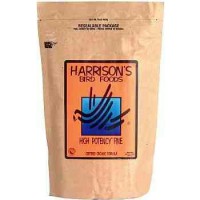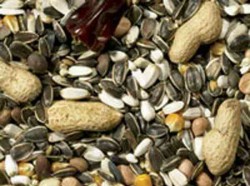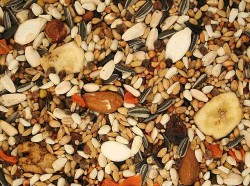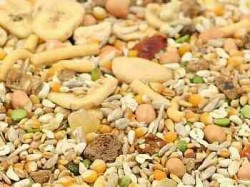Proper Nutrition
Proper and adequate avian nutrition combined with good husbandry is probably the single most important factor in insuring that your pet bird lives a long and healthy life.
The good husbandry aspect is very straight forward; supply your companion with a roomy, clean environment with full spectrum lighting, plenty of toys, quality time with you, regular veterinary care and most important of all plenty of mental and physical stimulation. The proper and adequate nutrition aspect is more complicated and complex.
Formulated Food - Pellets
Research and experience show that birds stay healthier and live longer on formulated diets rather than seed-based only diets, no matter how nutritionally complete a seed based diet claims to be!
A seed-only diet is inappropriate for psittacine birds. Seed is high in fat and low in most nutrients necessary for good health. Parrots that eat seed only will suffer from nutritional deficiencies even though they may look healthy, and may even be overweight.
Fortified seed has most of the fortifications in the hulls. Often bird owners think that they are providing a complete diet by purchasing fortified seed mixes. Unfortunately, the vitamins and minerals are coated on the seed hulls, which are discarded when the bird eats the seed.
Formulated diets, also known as pellets, are manufactured to meet the specific nutritional needs of companion birds. Ideally, the diet of companion birds should be composed of a minimum of 50-60% pellets, with the remainder in healthy table foods and produce. Recent studies have found some pellet brands to contain too much zinc & vitamin D3, which can contribute to zinc poisoning and kidney failure in pet birds. When purchasing a pellet brand stay away from the coloured ones, choose a brand with no artificial colouring. And make sure it is always made from organic ingredients.
Some birds convert to formulated diets quickly and willingly, while others may take weeks or months. Owner persistence is the key to successful dietary conversion. The formulated food should be offered in a separate dish and left in the cage at all times along with fresh vegetables. Usual food items (such as seed and table food) should be restricted to one hour twice daily, preferably morning and evening. It is extremely important that you don't forget to feed your bird his normal seed and table food twice daily until he eats sufficient amounts of vegetables and pellets.
Many birds will not initially recognise pellets as food and can starve themselves to death. Most birds will start to nibble on the formulated food within a few days to a few weeks and the usual foods are gradually withdrawn until they compose 25% or less of the diet.
Please be sure your bird has had a recent veterinary exam before changing the diet to screen for any underlying health problems and obtain a current weight. If you are looking for an avian vet near you please go to our find avian vets page.
Parrot Seed Mix Comparisons
Before buying your Parrot seed, compare the difference in quality, above you can see the differences.
The first picture is seed bought from a pet store. The main thing to compare is the amount of sun flower seed and monkey nuts, both these are not good for your Parrot in huge quantities. They contain far to much fat that's not good for your Parrot and contain almost no nutrition.
Pets stores also sell a mix that looks more like Rabbit food, this type should also be avoided.
The second picture In this mix there is hardly no Sunflower seed and no monkey nuts.
The third picture This mix contains no sunflower and no monkey nuts.
Table Food That's Good for your Parrot
Most produce and table foods that are good for people are nutritional for birds as well. All fruits and vegetables should be washed thoroughly before feeding! Some of the most beneficial foods are dark, leafy green vegetables like kale, broccoli, dandelion greens, swiss chard, mustard greens, etc., as well as carrots, cooked sweet potatoes and squash. Lettuce and celery are not recommended since they contain mostly water and sodium and no nutrients. If you must feed your bird lettuce, romaine would be the most beneficial one.
Note: Spinach is very high in calcium BUT it is also very high in oxalic acid which binds to calcium. In other words spinach is not a good source of calcium for your bird. In addition given over an extended period of time it can cause gout. Some greens that are safer are collard greens, mustard, dandelion, alfalfa greens, water cress and escarole. It's all in the amount and frequency that you feed greens. If you give your bird a variety of greens in small quantities a couple of times a week it doesn't really matter which greens you give him! Just don't overdo it!
Although all fruits are acceptable, they should only be offered in small amounts due to their high water content. Orange fruits such as papaya, mango and cantaloupe are highest in vitamin A and would be most beneficial.
Healthy table foods, such as cooked egg, corn, peas, beans, pasta, rice (brown is best), and low sugar and low sodium cereals etc, can also be offered in small amounts.
You should never feed your bird avocado or chocolate. They are poisonous to birds and fatal if fed in sufficient amounts. Food high in salt and fat such as chips, pretzels, crackers and preserved meat should also be avoided since birds are very sodium sensitive.
Egg Food
Egg Food is a complementary food for all species of seed-eating birds. Because of its coarse structure this product is completely absorbed and contains all the vital nutrients for young and adult birds during the resting, breeding, and moulting season: (animal and vegetable) proteins, vitamins, amino acids, minerals and trace elements.
Egg Food is composed of quality ingredients: egg, honey,… Thanks to the additional honey Egg Food is ready for use.
Instructions for use:
To be fed straight to the birds or can be added with germinated seeds, vegetables and/or fruit.
• Resting period: feed 2 to 3 times weekly 1/4 of a daily ration of Egg Food.
• Breeding season: feed birds with Egg Food as much as they like.
• Moulting period: feed 1/4 of a day’s ration of Egg Food on a daily basis.
Ingredients: bakery products, egg and egg products, vegetable protein extracts, seeds, sugars, oils and fats, minerals.
Warning! Don't offer birds Grit or Gravel
While not a food, grit is something people think all birds need. They do not. If it is overeaten, grit impaction can occur in the digestive system. Finches and canaries may benefit from a couple of grains of grit every couple of months, but budgies, cockatiels, parrakeets and other parrots do not need it.
Vitamin and Mineral Supplements
Birds that consume at least 25% of their intake in formulated food (Pellets or Egg Food) do not require vitamin and mineral supplements and further supplementation can actually be toxic. Supplements include powders, drops, and mineral blocks.
We hope this overview of feeding your pet bird will not only stimulate you to review your bird's needs, but also to look at your pet's diet in general. If you know of a friend whose bird is not enjoying the benefits of a completely balanced diet, take a few moments to educate him or her and help benefit the lives of both bird and its owner.




